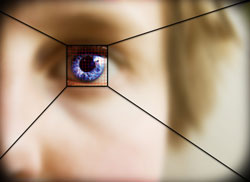Laser Eye Surgery: 10 Risks To Consider
Laser eye treatment is now a well-established procedure and as we see continuing technological development and treatments
of this type are more widely accepted, so ever more people are turning to laser eye surgery as an alternative to glasses or
contact lenses.
But what are the risks of laser eye treatment?
Though the chances of encountering a serious vision-threatening complication, or severe eye injury, following laser
eye treatment are very small indeed, treatment is not risk-free and in this brief article we will look at a few of the more
commonly seen problems.

Decrease in Best-Corrected Vision: After laser eye surgery, a few patients find that with corrective
lenses the best vision obtainable is in fact worse than it was before laser eye treatment was done. This may be
the result of the irregular removal of tissue or from the development of corneal haze.
Regression: In the months following laser eye treatment some patients find that the effects of the procedure
are gradually lost. This can be likened to the risk of undercorrection, and a re-treatment is often feasible.
Infection and delayed healing: Although there is a chance that the cornea will become infected following
laser eye treatment, the chances of this happening are less than 1 in 1,000. Generally, this means added discomfort
and a delay in healing, with no lasting effects appearing within a period of four years.
Undercorrection/Overcorrection: It is not possible to predict perfectly how the eye will respond to laser eye
treatment. Consequently, corrective lenses may still be needed after the procedure to obtain good vision. On occasion,
further surgery can be done to improve the result.
Excessive Corneal Haze: Corneal haze can occur as part of the normal healing process after surgery.
More often than not, it has little if any effect on final vision and can only be seen by an experienced eye doctor
with the use of a microscope. Nevertheless, cases of excessive haze that interferes with vision do occur which can
often be healed using further laser eye surgey.
Problems with a Perfect Procedure: Even when everything goes smoothly, the procedure can produce effects that
might cause some dissatisfaction. Older patients need to be aware that they cannot have both good distance vision and
good near vision in the same eye without requiring corrective lenses. Some patients suffering from myopia rely on their
myopia (by taking off their glasses, or by wearing a weaker prescription) when they want to read. Such a patient might
need reading glasses after the myopia is corrected surgically.
Flap Damage or Loss: Although it should remain hinged to the cornea, the flap of tissue produced on the
central cornea can become detached. In this case the flap can be replaced after the procedure, however, the risk
of loss, or damage to, the flap still remains.
Halo Effect: The halo effect is an optical effect that is experienced when light levels are low. That part of
the periferal cornea that remains untreated creates a second faded image as the pupil enlarges. For some patients this
effect can interfere with night driving.
Distorted Flap: Irregular healing of the corneal tissue flap can produce a distortion to the cornea,
resulting in a decrease of best-corrected vision.
Severe dry eye syndrome: The eye may not be able to produce sufficient tears to keep the eye moist and
comfortable as a result of laser eye treatment. Dry eye does not only create discomfort, but may cause a drop in visual
quality as a result of intermittent blurring and other visual symptoms. This problem might be permanent. Intensive eye drop
treatment or further surgery might be needed.
You've probably concluded at this point that laser eye treatment is simply too risky, but we should just put
things into perspective.
Though all of the risks mentioned here are very real risks and do arise on occasion, the chances of encountering any of
these problems is extremely small. Thousands of procedures are carried out around the world every day and, in the
overwhelming majority of cases, patients are very happy with the results.
This article is not designed to scare you off, but merely to assist you in making a sound decision considering
both the pro's and the con's before embarking upon laser eye treatment.
|